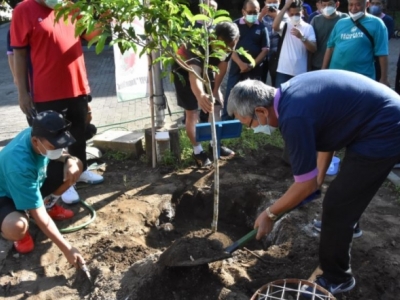Celebrating 58th UNY Anniversary with tree planting

Universitas Negeri Yogyakarta welcomed its 58th anniversary by planting three trees. The trees planted are the tanjung tree (Mimusops elengi), mango tree (Mangifera indica), and tamarind tree (Tamarindus indica). The chairman of UNY alumni, Prof. Suyanto is one of the foster parents for several trees currently growing at UNY. Prof. Suyanto once planted a kepel tree (Stelechocarpus burahol) in conjunction with the inauguration of GOR UNY by the President of the Republic of Indonesia, Susilo Bambang Yudhoyono. Meanwhile, in 2022, Prof. Suyanto chose to plant a tanjung tree because this tree species is already classified as rare.
According to Prof. Suyanto, the tanjung tree has several advantages. The flowers smell good to be used as air fresheners or clothes fresheners. The wood is dense and hard, so it is used for pegs in boat construction, spear shafts, and other utensils, cupboards, furniture, and house poles. Quoted from Wikipedia, tanjung tree wood is also suitable for carving materials, floor coverings, and railroad sleepers. The cape tree has a shady title so it is widely used for shade on the road's edges. For the Javanese people in Yogyakarta, the tanjung tree is also a tree that is considered to have philosophical values. This tree is planted along the 'philosophy axis' of Krapyak – Alun-alun Selatan – Kraton – Alun-alun Utara – Tugu, together with tamarind, mango and other trees.
Prof. Sumaryanto as Rector of UNY planted a mango tree. While Prof. Zamzani as Chairman of the Senate planted tamarind trees. The selection of these two types of trees is based on the many benefits of this tree for humans. The mango tree originating from India contains nutrients such as fiber, carbohydrates, protein, vitamin A, vitamin C, calcium, magnesium, and phosphorus. Mangoes are also popular with the public because they are fresh and healthy for consumption. At the same time, the tamarind tree is widely used by the community as a cooking spice or a sour taste enhancer. In addition, tamarind is also used in various kinds of traditional herbal medicine, including to reduce inflammation or pain as a poultice. A decoction of the tamarind tree leaves can treat coughs and fevers, while the impact of the bark can treat wounds, ulcers, or boils.
"This morning's activity is part of a series of 58th UNY anniversary celebrations. Hopefully, everyone in faculties and units will follow this movement to keep a green and healthy environment and also prevent global warming," said Prof. Sumaryanto(Dedy, Tj.Lak)

